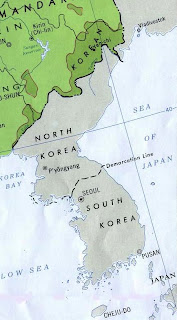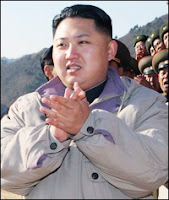Among the pantheon of North Korea watchers, Selig Harrison is a laughable character. When he's not justifying acts of murder while playing the role of Pyongyang's mouthpiece, he's making proposals that the US unilaterally take South Korean territorial waters and hand them over to North Korea, a move that had me wondering if he was a paid shill for Kim Jong-il.
So naturally I assumed
Mr Harrison's latest piece in the New York Times, "China's North Korea calculations," would be more chicanery*. But
assumed just makes an ass out of you and your meds, so I figured I should at least give the guy a fair read; after all, I have found myself in agreement with Mr Harrison on at least one occasion. And as it turns out, this may be another one of those times:
Two standard explanations are generally offered to explain why China is reluctant to put pressure on North Korea, whether the issue is nuclear weapons, the sinking of a South Korean Navy vessel, or the shelling of Yeonpyeong [Yŏnpyŏngdo] Island: China’s fear of instability if North Korea implodes, with the resulting massive flow of refugees across its borders, and China’s appetite for North Korea’s vast reserves of iron ore, magnesite, copper and other minerals.
Both of these explanations are valid and important. But more basic geostrategic factors, as well as latent separatism among ethnic Koreans in China’s border region, are also behind its approach to the Korean peninsula.
Of course, the notion that ethnic Koreans in the eastern Kando region (salmon-colored in the map below) may seek to have their region rejoined with a unified Korea, or that Seoul itself might seek to regain that territory, is not a new idea. It pops up from
time to
time to
time, and I myself have written about the prospect (
here, and more recently
here and
here).
In fact, I have been suggesting for at least the past decade that China might be quietly concerned about such a prospect, to the point that they may have lowered the official number of ethnic Koreans in the region (it was reported as about one million in the early 1990s, but it may be as high as ten million). Mr Harrison explains in more detail what he sees as China's current concerns:
Another little-noted factor that has surfaced in my conversations in Beijing over the past four decades is the fear of nascent Korean nationalism among the 2.5 million Koreans who live in the three northeastern provinces of China contiguous with North Korea.
 |
| [PRC map of Korean-speaking areas] |
What has made the political potential of its Korean minority worrisome to Beijing is
the linkage between the Koreans of northeast China and cultural movements in South Korea such as the Damul Institute. China is aware that damul means “reclaim all,” and the founder of the Damul Institute, Ki Joon Kang, has written of the “
Korean people’s fervent hopes to recover our lost land.”
In recent decades, the Damul Institute regularly took well-financed delegations consisting largely of South Korean businessmen on tours of northeast China designed to
stimulate an awareness of the area as part of the Korean heritage and a good place for Korean investment. More than 100,000 people went on these tours after the establishment of diplomatic relations between Beijing and Seoul in 1992.
The vigor of the Damul movement, which in the 1990s claimed 50,000 members, led Chinese Prime Minister Li Peng to protest against its activities at a meeting in 1995 with visiting South Korean Prime Minister Lee Hong-koo.
Damul spokesmen then became more circumspect, emphasizing cultural objectives and denying any irredentist goals.
Well, that certainly complicates things. Seoul officially makes no claim to the region, and Pyongyang has settled its border with Beijing, so ROK officials should make clear to their PRC counterparts that irredentism will be supported in no way whatsoever. Though freedom of speech (a concept which Beijing is not familiar and with which Seoul is only recently acquainted) precludes South Korean authorities from shutting down groups like the aforementioned Dhamul, officialdom should in no way be supporting them. Kando should not become Korea's
Aztlán.
Of course, non-support of this irredentism is one of several assurances Seoul will have to hold its nose and make to Beijing in order to convince the Chinese to stand back when/if North Korea collapses and South Korea takes over. Among them, Washington and Seoul should already be giving hints that US forces will remain in a newly reunified Korea (the Pax Americana being
the greatest source of peace and stability northeast Asia has had in a very long time) but that the Americans will
not be stationed anywhere north of a certain point well to the south (e.g., Pyongyang, the current DMZ, or 38°N). While I'm loath to kowtow to China on Korea-related policy, it's merely a pragmatic realization that China wants its psychological buffer, and it would be a shame to prolong the agony of the people in North Korea when a simple solution presents itself. (And it goes without saying that no agreement between Washington and Beijing over Korea should come at Taiwan's or even Japan's expense, but that's another matter.)
A premise of my argument is that China alone has the ability to pull the plug on the current regime, or at least to turn out the lights for a while, and that we
might be able to convince them to do so if (a) North Korea becomes such a danger and/or embarrassment for them that they see this as a favorable course of action, and (b) we make it worth their while. Again, this may mean more holding of one's nose.
China seems to have decided that Manchurianization of North Korea —
reforming the North's economy while integrating it with China's northeastern provinces — is the best way to go, and they have started investing billions of dollars in the DPRK (this is almost criminally neglected by the Western press as they get their panties wet writing about Kim Jong-il's supposed rise to power). Simply put, China will not allow North Korea to absorbed by South Korea unless it has assurances that their investments will be protected.
And even then, I'm not so sure. That's because, more importantly, China's recent involvement in North Korea's economy may have also given it something it has long coveted: access to a seaport on the East Sea (aka Sea of Japan). Mr Harrison himself brings this up:
A more immediate factor in China’s strategic calculus is that it hopes to get access to the Sea of Japan for the first time by helping to develop a new North Korean port at Rajin.
China is also interested in keeping Russia and Japan from making inroads into the North.
I don't see China being so concerned that Russia (which is just north of Rajin) or Japan (just cross the sea) are getting involved in North Korea (given that Chinese-style reforms are their goal), as much as I think they just want that port. Access to the ocean near where China, North Korea, and Russia meet means Chinese ships have considerably less distance to travel on their way to North America. It gives an impetus to plans to develop exporting industries in Manchuria. And like Gollum grasping that dastardly ring even to the point of plunging into a pit of molten lava, they won't give up something so precious that they are so close to having. [
UPDATE: It appears that North Korea will allow Chinese troops to be stationed in the DPRK for the first time since 1994, ostensibly to protect their new port facilities in Rajin.]
So why not give it to them? Yeah, this is one of those creative compacts that could solve everything, like Tokyo giving up all claims on
Takeshima Tokto in exchange for Seoul's tacit approval of a 200-nm EEZ around the remote
Okinotorishima:
If Beijing supports a peaceful unification of the Korean Peninsula, Seoul agrees to give China a 99-year lease of a strip of land on the Tuman River, not so far inland that seagoing ships cannot reach it and with guaranteed access to the sea, that can be developed into a major port and a railway corridor to China's interior.
How's that for a grand bargain? Beijing just might go for it, given their familiarity with 99-year leases. Just make sure the handful of North Koreans who are displaced from their homes are very well compensated, Korea still has a border crossing with Russia for both rail and road, and China is not granted an EEZ in the East Sea (Sea of Japan) from this concession.
So in conclusion: The thing to do now is to entice China to stop supporting the Pyongyang regime and to make things easy for South Korea to absorb the North, by (a) assuring Beijing that US troops will not be on China's border, (b) a unified Korea will forego any irredentist attempts to assume territory now under PRC control, (c) China's investments in the former DPRK will be protected and honored by a future unified Korea, and (d) if China plays nice it will be rewarded with access to the East Sea (Sea of Japan).
And if that works, I deserve the Nobel Peace Prize more than President Obama did two years ago.
* I kid you not: Sarah Palin thought a chicanery was a place where they produced Chicanos. Okay, I'm kidding.
Sphere: Related Content


























































